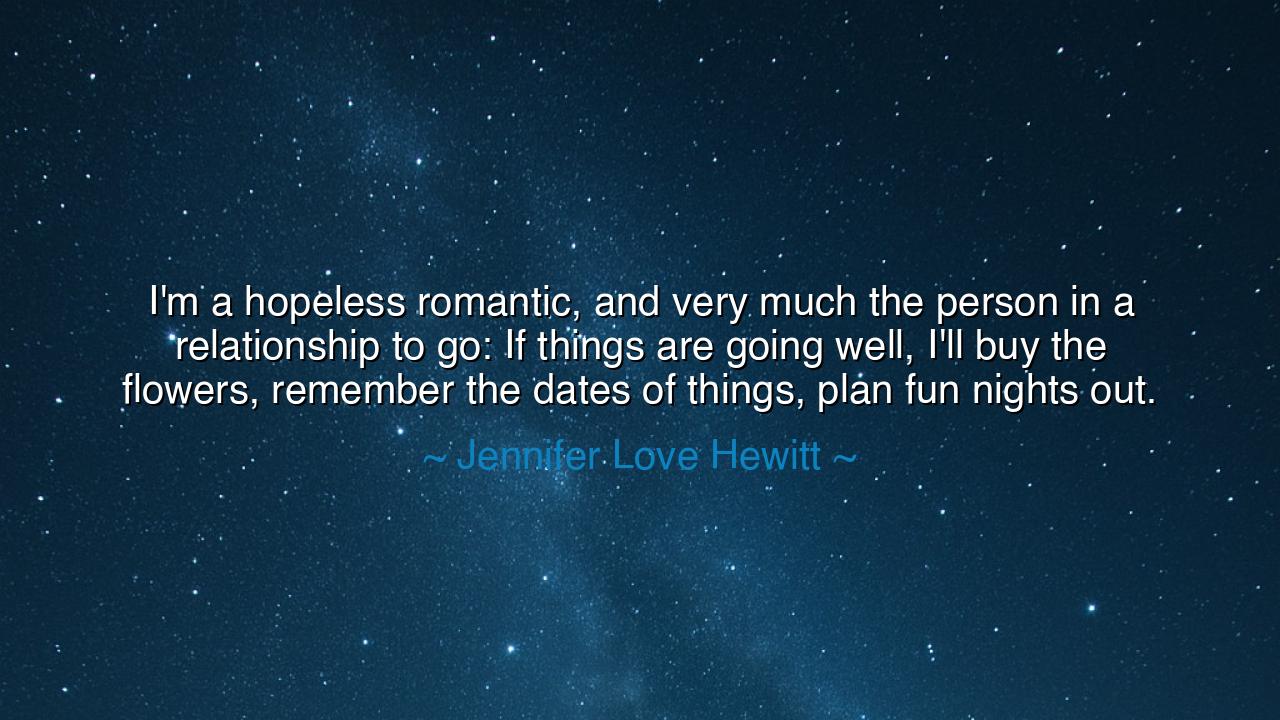
I'm a hopeless romantic, and very much the person in a
I'm a hopeless romantic, and very much the person in a relationship to go: If things are going well, I'll buy the flowers, remember the dates of things, plan fun nights out.






The words of Jennifer Love Hewitt shine with candor and devotion: “I’m a hopeless romantic, and very much the person in a relationship to go: If things are going well, I’ll buy the flowers, remember the dates of things, plan fun nights out.” In this confession, she does not speak of love as a distant dream or fleeting spark, but as an active devotion, a daily choice made visible in deeds both small and tender. To be a hopeless romantic here is not to pine helplessly, but to live fully in the rhythm of affection, weaving romance into the fabric of everyday life.
The ancients would have recognized this truth. They understood that love is not sustained by words alone, but by gestures that renew the bond between two souls. The poets of Greece and Rome often spoke of garlands, feasts, and festivals given in honor of beloved ones. A wreath of flowers placed upon the head of a lover, or a song sung in remembrance of a shared moment, was no mere ornament—it was the breath of relationship, keeping it alive and radiant. So too does Hewitt reveal that buying flowers, remembering dates, and planning nights out are not trivialities, but sacred rituals that nourish love.
There is humility in her words as well. She admits herself a hopeless romantic, one who cannot help but believe in love’s beauty and worth. The world often mocks such souls, calling them naïve, yet in truth they are the keepers of a great flame. For relationships, like temples, do not stand on their own; they must be tended, honored, and adorned. By remembering the dates, planning the evenings, giving the flowers, she shows us that the greatest romances are not sustained by chance, but by care.
Consider the story of Shah Jahan, who built the Taj Mahal in memory of his beloved Mumtaz Mahal. Though this monument was far grander than a bouquet or a night of laughter, its heart was the same: the desire to honor love through action, to say, “I remember, I cherish, I will keep your memory alive.” The scale may differ, but the spirit is one. Whether in a palace or in a home, love thrives when it is remembered, celebrated, and kept alive by the steady devotion of the heart.
There is also a heroic quality in Hewitt’s words. For to take the initiative in love requires courage. Many wait passively for romance to arrive; few are brave enough to create romance through effort and intention. Her words remind us that to love is to act, not only to feel. A relationship flourishes when both give, when both bring light and joy to the other. In this way, love becomes not a stagnant pond but a flowing river, always fresh, always renewed.
The lesson is clear: if you love, show it. Do not assume the beloved knows your heart without reminders. Speak it in words, yes, but also in gestures. Buy the flowers. Remember the dates. Plan the nights out. Let romance live in action as well as emotion. For without such tending, even the greatest flame may dwindle, but with it, even a small fire may become an eternal light.
Therefore, let all who hear take action: be bold in your devotion. Do not fear to be a hopeless romantic, for in such “hopelessness” lies the hope of lasting love. Create joy for your beloved, honor the moments you share, and keep alive the rituals that make your bond sacred. For as Hewitt teaches us, the strength of a relationship lies not only in passion, but in remembrance, intention, and care.
Thus her words endure as a guide for all lovers: romance is not only in grand gestures, but in daily acts of love. To be a hopeless romantic is not weakness—it is the wisdom of one who knows that love, to live, must be continually chosen, continually celebrated, continually renewed.






AAdministratorAdministrator
Welcome, honored guests. Please leave a comment, we will respond soon